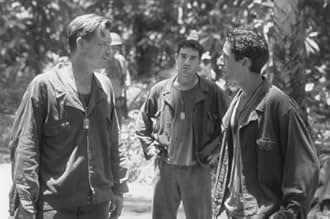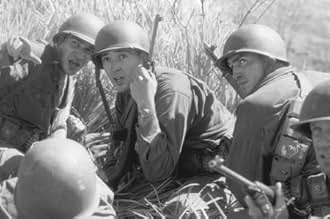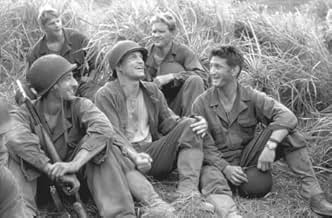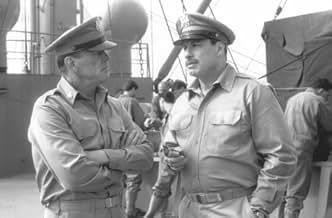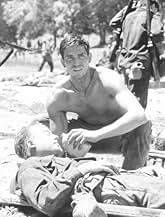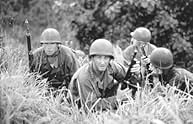Liberamente ispirato al romanzo autobiographico di James Jones, ambientato alla battaglia di Guadalcanal durante la seconda guerra mondiale.Liberamente ispirato al romanzo autobiographico di James Jones, ambientato alla battaglia di Guadalcanal durante la seconda guerra mondiale.Liberamente ispirato al romanzo autobiographico di James Jones, ambientato alla battaglia di Guadalcanal durante la seconda guerra mondiale.
- Candidato a 7 Oscar
- 23 vittorie e 47 candidature totali
- Witt's Mother
- (as Penny Allen)
- Melanesian Villager
- (as Benjamin)
Recensioni in evidenza
The Thin Red Line asks a lot of good questions about death, war, and the ultimate meaning of life. Now that I have seen it, I'm very surprised that this film did not win picture of the year. Spielberg's film was a gritty, realistic portrayal of war. But it was also highly commercial and had a very contrived plot. In comparison, this film sort of wanders through itself and in the process helps to put you in the boots of the soldiers it portrays.
My only criticism is perhaps the film was a bit long, but I never noticed that the second time through. I can't praise this film enough. Excellent work.
Terrence Malick's films are not everyone's cup of tea, and this is not only not the exception, but probably the most extreme example of that at display: There are many qualities from this movie that are frankly admirable (Particularly its brilliant cinematography and performances) but it is also the kind of movie that is quite tedious to watch at moments.
And it's already a pretty long film, it feels even longer than it actually is.
If you are about to watch this, don't expect something like "Saving Private Ryan". Expect something more akin to Apocalypse Now Redux: A brilliant, but also tedious movie that is both beautiful and both tiring at moments.
Malick came in with this pack, concerned with newly emerging ideas about meaning and language. The philosophy establishment was forming a new split (US and Continentals) largely characterized by how to reinvent Wittgenstein's insights but with a more friendly rationale. Chomsky was shaking one world, formal abstraction for computers another. Exciting --- moreso than today. But Malick was not a verbal communicator, nor a logician, nor an academic (all sides of the same thing). So he dove into practical visual semiotics.
He is not a brilliant man, merely a journalist. But he does seem to be particularly honest and understands some damned good, solid, human ideas compared to other filmmakers. One can really see this early MIT exposure in 'Red Line.'
We can thankfully forget plot -- there is not meant to be any story. In fact, the war is only used here as a canvas of motion, abstractions of 'regular' life, colliding and sometimes adhering to souls, sometimes destroying them. The device is to build the film around the sounds: narrative voiceovers (current and remembered), natural sounds, haunting music. The images are attached to the sounds, which are derived from abstractions. This is exactly the reverse of Spielberg, which is why there cannot be any comparison to 'Private Ryan,' or any other film that is 'about' something. It is why Malick can never 'explain' his films.
The execution is hypnotic. I wonder what the six-hour version is like. The editing (and particularly of the sound) is unusual, so transports us beyond the strangeness of tropics, war, history. That editing is much like Van Morrison's music: it establishes the rhythm only as a reference to dance around, peeking in and out. The relationship of the rhythm within the shots to the rhythm of the shots is very bluesy.
Having no story opens new possibilities and creates unfamiliar problems. An opportunity is that the film can have many centers: the meditator in the midst of the attack on the camp; the squabble of the villagers; the transport of the ship; the need to look at our own dogtags. The challenge is how to end. When you stick to a formula like Spielberg, you just turn the crank and the climax lifts and comes down, and the story finishes. No story, no formula, so Malick brackets with the transport to and from the island, by the aging of the southern rookie, and by the exit from and re-entry to a world of unfamiliar characters. That they are played by familiar actors (Travolta, Clooney) oddly emphasizes the point.
It must have been educational to work on this film, which is why every intelligent actor (or an actor with an intelligent agent) wanted to participate: one can see direct influence in Penn's 'The Pledge' and Cusack's 'High Fidelity,' both highly abstract.
Penn knew exactly what he was doing here. He moves in the action, as an actor must. But he places his character offscreen in the abstract voiceovers. That's the 'real' Welsh, and the film's image only an abstraction. He truly understands presenting many dimensions simultaneously. Harrelson doesn't, but that's the point with Keck. I wonder why Depp didn't make the cut?
The company is not made up of conscripts but regular soldiers. Some of them have been in the Army more than 10 years. Some of them however have never seen real action before and this is a hot and uncomfortable location, despite the lovely tropical scenery. Some crack up, some die, some do heroic deeds. Their leaders are not particularly admirable; one is quite happy to get his men killed if he can come out of the action looking good.
Out of sight for most of the film are the Melanesian inhabitants, the Solomon Islanders, who are carrying on living as best they can while the war rages around them. Their serenity is in sharp contrast to the frenetic military activity. Of course, there is nowhere for them to go.
There is some action excitingly filmed but as in real wars much of the time is spent preparing and waiting. Personal stories unfold but at the end it is survival that matters.
The lighting and photography is quite superb, the lighting in particular fitting the mood perfectly. Filming was not actually on Guadalcanal but near Port Douglas in Northern Queensland where there is similar tropical rainforest and fauna but with much easier logistics. It took ages apparently but seems more than worth the effort.
This is probably one of the four or five greatest war films ever made, right up there with "All Quiet on the Western Front, " "Paths of Glory," "Bridge on the River Kwai" and "The Longest Day." Never has a movie better portrayed what it's like to be a frontline soldier.
Terrence Malick has the reputation of being an eccentric, difficult director - Kubrick without the fear of flying. Yet this is not a particularly unconventional movie - it's just that everything hangs together - the story, dialogue, performances, photography and settings. On thing is clear - this is a better interpretation of James Jones' novel than the 1964 version.
about the oscars, i only watched the film after its surprise nomination for best picture. i had seen the competition already, and it was time to check out the fifth nominee. i went to the theatre myself, and came out three hours later, went home, and i cried. not only because i was disturbed, but i loved every single character in the film. i wanted to be there for them, cry with them, fight their battle. many people who have watched the film have said the same thing to me.
the Thin Red Line is sometimes painful to watch, but only because of its realistic juxtaposition of humanity, philosophy, and the terror of war. the film does not delve into any historical fact about Guadalcanal, except that the battle itself was terrifying (as is any battle). the characters introduce themselves through voice-over narration, which accompanies much of the action. and speaking of action, there is not much in the film. more images. images of war and the lives these soldiers left behind. this was Terence Malick's intent, of course, and many people were insulted and thought it was his own pretentious self getting the best of him. "boy he's a genius.. must he show it??" sometimes it is a little pretentious, but the film would've been "just another WWII film" if it was out of Malick's hands.
i can not understand why Sean Penn is billed as the top actor or the main character of this film. he was there a lot, but the film is carried by Jim Caviezel as the beautiful and ethereal private Witt. words can not describe this performance. with as few lines as he had, Caviezel portrays the symbolic soul of Witt, and by the end of the film he will break your heart. also excellent performances from Nick Nolte and the understated Elias Koteas, who can stretch creepy (Crash) to sympathetic in the blink of an eye.
now.. let's consider hollywood. sure they love Spielberg, and sure Private Ryan was a masterpiece (and it really was), but nobody even expected the Thin Red Line to get seven oscar nods, especially for best picture. but Shakespeare in Love was the crowd pleaser, and the other two were epic war films. most hollywood "artsy" people are anti-war.. kind of like the Thin Red Line. Private Ryan seemed to be MUCH more patriotic "pro-america" than the other. so if we've got anti-war on one side, and patriotism on the other... open and shut. the votes were split between the two, and Shakespeare emerged victorious. too bad.
anyway... the Thin Red Line was definitely better than Shakespeare, and definitely a completely different film from Spielberg's. John Toll's cinematography and Hans Zimmer's score work together to convey the tone of Malick's lyrical and poetic direction, and both should have won oscars. this film is nothing short of breath-taking, though understandably not for the average american moviegoer.
Lo sapevi?
- QuizMost of Adrien Brody's scenes were cut from the film and he wasn't aware of these changes until he saw the film at the premiere. Brody came to the premiere expecting to see himself as the lead character and was shocked when he saw that he was barely featured in the film, especially since Cpl. Fife was the central character in the novel on which the movie was based.
- BlooperIn one of the flashback scenes where the soldier and his girlfriend are holding hands, modern cars can be seen out the window in the background.
- Citazioni
Private Edward P. Train: [narration] This great evil, where's it come from? How'd it steal into the world? What seed, what root did it grow from? Who's doing this? Who's killing us, robbing us of life and light, mocking us with the sight of what we might've known? Does our ruin benefit the earth, does it help the grass to grow, the sun to shine? Is this darkness in you, too? Have you passed through this night?
- Curiosità sui creditiComposer Wrangler. . . Moanike'ala Nakamoto
- ConnessioniFeatured in HBO First Look: The Thin Red Line (1998)
- Colonne sonoreThe Unanswered Question
Composed by Charles Ives
Performed by Orchestra of St. Luke's (as The Orchestra of St. Luke's)
Conducted by John Adams
I più visti
- How long is The Thin Red Line?Powered by Alexa
Dettagli
Botteghino
- Budget
- 52.000.000 USD (previsto)
- Lordo Stati Uniti e Canada
- 36.400.491 USD
- Fine settimana di apertura Stati Uniti e Canada
- 282.534 USD
- 27 dic 1998
- Lordo in tutto il mondo
- 98.126.565 USD
- Tempo di esecuzione2 ore 50 minuti
- Colore
- Mix di suoni
- Proporzioni
- 2.35 : 1
Contribuisci a questa pagina






